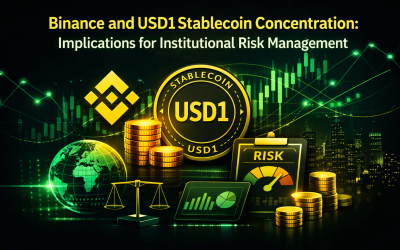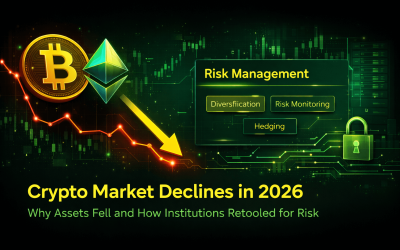When we talk about the “fastest-growing blockchains,” the focus is not just on token prices or speculative hype. Growth in 2025 is measured by real adoption and sustained usage. The key signals of expansion include:
- Active wallet addresses completing transactions
- Transaction speed and affordability
- Trading and settlement volumes across DeFi protocols
- Developer activity, ecosystem expansion, and upgrades
- Total Value Locked (TVL) in decentralized applications
In short, the blockchains that are thriving today are the ones demonstrating practical utility—whether that’s powering stablecoin payments or running decentralized exchange ecosystems. This real-world traction is what businesses and institutions pay attention to, and it directly connects to the need for enterprise-grade wallet solutions.
The Blockchains Leading Adoption in 2025
A handful of networks are standing out for their rapid user growth and technical progress. Instead of looking at them in isolation, let’s examine what makes each of them appealing to enterprises, developers, and end users alike.
Solana
Known for speed and efficiency, Solana has emerged as a hub for DeFi trading, and high-frequency token transfers. Its proof-of-history consensus model has helped it attract over 50 million monthly active users. While Solana continues to battle concerns around centralization and reliability, its institutional traction is undeniable.
Near Protocol
Near has positioned itself as a developer-friendly L1 with AI-native features, offering extremely low fees and carbon neutrality. Its sharding design allows it to scale efficiently, giving it momentum with both DeFi and gaming applications.
BNB Chain
Backed by Binance, BNB Chain has built on its strong EVM compatibility to remain one of the busiest DeFi ecosystems. Its reduced block times and integrations with AI-driven tools have attracted tens of millions of active users, though its centralization remains a talking point.
Base
Coinbase’s L2 network, Base, has grown rapidly thanks to its seamless integration with Coinbase’s massive user base. Its affordable fees and strong consumer-facing ecosystem have positioned it as one of the most promising Ethereum rollups.
Tron
Tron continues to dominate the stablecoin settlement market, enabling billions of dollars in transfers at minimal cost. Its ability to integrate with consumer apps has been a major driver of adoption, particularly in markets with high remittance needs.
Bitcoin
Still the world’s most recognized blockchain, Bitcoin’s growth today is driven less by retail hype and more by institutional adoption through ETFs and reserves. Its role as a strategic asset continues to anchor its place in the top ranks.
Aptos
Aptos, built by former Meta engineers, is competing through technical innovation with its Move programming language and high throughput. While still gaining ground compared to giants like Solana and Ethereum, it has made impressive progress.
Ethereum
Ethereum remains the foundation for smart contracts and DeFi. Despite fee challenges, its upgrades and institutional staking programs ensure it continues to play a central role in blockchain adoption.
Polygon
Polygon’s scaling solutions have made Ethereum more accessible to enterprises and mainstream brands. Its upgrades in interoperability and partnerships with global corporations have cemented its role as a multichain enabler.
Arbitrum
As one of the leading Ethereum L2 solutions, Arbitrum offers low fees and robust security. Integrations with mainstream apps like Robinhood highlight its position as a bridge between Web2 and Web3 adoption.
Vaultody Supports 8 of the 10 Fastest-Growing Protocols
What sets Vaultody apart is that we already support eight of these ten fastest-growing blockchains: Solana, Base, BNB Chain, Tron, Bitcoin, Ethereum, Polygon, and Arbitrum. This positions Vaultody as a core wallet infrastructure provider for enterprises needing access to the most active and liquid blockchain ecosystems.
And as the industry evolves, Vaultody offers the flexibility to add support for new blockchains upon demand, ensuring that businesses can grow with confidence as new protocols rise.
Why Wallet Infrastructure Is Critical to Blockchain Growth
The expansion of blockchain ecosystems also brings increased complexity for institutions managing digital assets. That’s why enterprise-grade wallet solutions have become a cornerstone of adoption.
By offering wallet infrastructure through WaaS, businesses can integrate blockchain functionality without the burden of building or maintaining their own secure wallet systems. As L1 and L2 networks proliferate, WaaS ensures that institutions can connect to multiple chains with minimal friction.
Multi-Party Computation (MPC) provides a new standard in wallet security by removing single points of failure. For businesses transacting in assets like Bitcoin, Ethereum, Solana, and others MPC ensures robust protection without sacrificing accessibility.
In addition, enterprises have different needs when it comes to control and compliance:
- Custodial solutions allow institutions to outsource secure asset management.
- Non-custodial solutions empower organizations and their users to retain full control while still leveraging enterprise-grade protections.
Vaultody delivers both, making it possible for B2B clients to tailor wallet solutions to their specific operational and regulatory environments.
Growth Meets Infrastructure
The story of 2025’s fastest-growing blockchains isn’t just about transaction speed or DeFi activity - it’s about how these networks are building real economies with millions of users. But for enterprises, growth without infrastructure is unsustainable.
Vaultody bridges this gap by supporting 8 of the top 10 fastest-growing blockchains, providing secure and scalable solutions like Wallet as a Service, MPC technology protocols, and non-custodial options for asset management. As more blockchains scale, wallet infrastructure becomes the critical link that allows institutions to store, manage, and operate digital assets with confidence.









 Copy link
Copy link